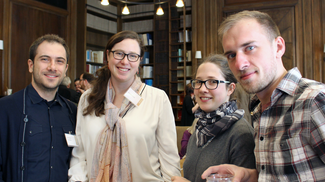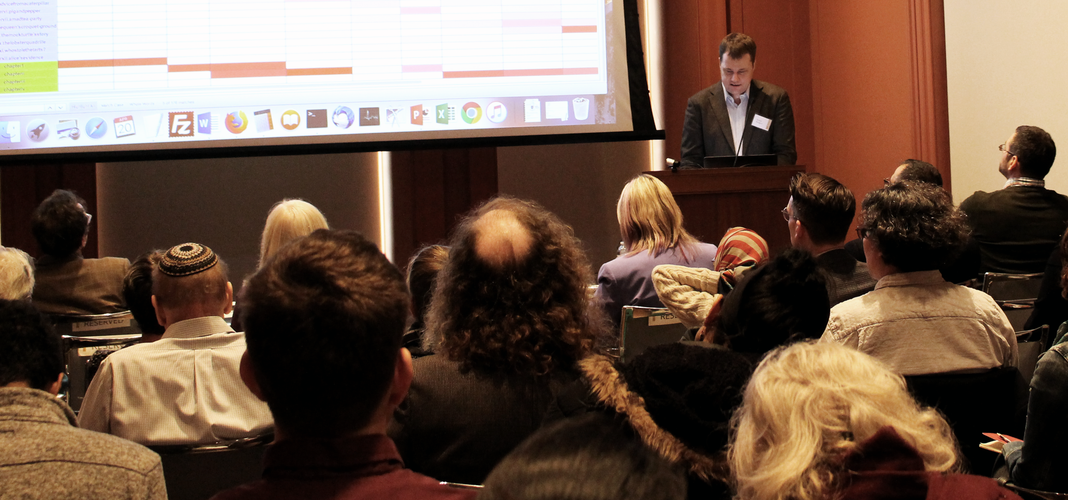Future Philologies, April 20, 2018
This article first appeared in ISAW Newsletter 21 (Spring 2018).
The ISAW Library hosted “Future Philologies: Digital Directions in Ancient World Text,” a conference organized by Patrick J. Burns, David Ratzan, and Sebastian Heath on the intersection of research on historical languages and computer science on April 20. The conference brought together scholars working on a diverse range of languages—Latin, Greek, Coptic, Persian, Arabic, Classical Chinese, and Sumerian were represented on the program—to discuss the effect that digitization and the ability to analyze massive amounts of text is having on philological research and teaching. The event was co-sponsored by the NYU Center for the Humanities, NYU Division of Libraries, NYU Center for Ancient Studies, and NYU Department of Classics. The complete “Future Philologies” program can be found at http://isaw.nyu.edu/events/future-philologies.
 Two things immediately stood out about the program, both of which capture the deeply interdisciplinary and interdepartmental aims of the conference: the diversity of historical languages and the evolving nature of the collaboration between humanities disciplines and computer and information science. In both its linguistic range and its incorporation of a digital approach to humanistic inquiry, the conference reflected in miniature important aspects of ISAW’s mission, namely a dual commitment to a wide geographic and broad chronological definition of the ancient world and the promotion of innovative research via digital platforms and rich scholarly communities in ancient studies.
Two things immediately stood out about the program, both of which capture the deeply interdisciplinary and interdepartmental aims of the conference: the diversity of historical languages and the evolving nature of the collaboration between humanities disciplines and computer and information science. In both its linguistic range and its incorporation of a digital approach to humanistic inquiry, the conference reflected in miniature important aspects of ISAW’s mission, namely a dual commitment to a wide geographic and broad chronological definition of the ancient world and the promotion of innovative research via digital platforms and rich scholarly communities in ancient studies.
A primary goal of “Future Philologies” was to assemble scholars working on large-scale ancient world text projects who might not otherwise find opportunities to discuss their work together. A cuneiform machine learning project will find an audience in a Near Eastern Language department, but perhaps not in a Classics department. Corpus-based approaches to periodization in Arabic literature could be readily adapted to the study of other ancient languages. Linguistic differences, to be sure, translate into differences in digital approach and design; but there is also a great deal of overlap at the foundational level of most computational approaches to languages, and “Future Philologies” took advantage of the common ground to expand the vision of all the projects involved. This kind of inclusive view of the ancient world is a core strength of ISAW, making it an ideal venue for a conference on the future of comparative philology.
 Donald Sturgeon (Harvard University) on Accessible Digital Text Analysis for Classical Chinese
Donald Sturgeon (Harvard University) on Accessible Digital Text Analysis for Classical Chinese
A further goal of “Future Philologies” was to include computer scientists in the discussion. Computer Science can be seen as a discipline of solving interesting problems that, whether for reasons of scale or subtlety, are difficult to solve through human study and cognition alone. Managing large collections of untranslated Sumerian tablets and making them accessible to automated searches is an interesting problem. The periodization of Arabic literature on stylistic and philological grounds over centuries is another interesting problem. Helping students to learn Greek, Arabic, and Persian more quickly and more effectively is yet another interesting problem. Philology, and comparative philology in particular, contains many such problems and, at the level of complex information problems, they are not dissimilar to those that CS departments study and solve in different contexts. These are the areas where we find some of the most innovative work on historical languages in the 21st century.
“Future Philologies” was organized as part of the Linked Ancient World Data series, which recently included LAWDNY workshops and last fall’s “Digital Publication in Mediterranean Archaeology: Current Practice and Common Goals.” This programming continues with our next conference “Digital Approaches to Teaching the Ancient Mediterranean” later this year on October 26.